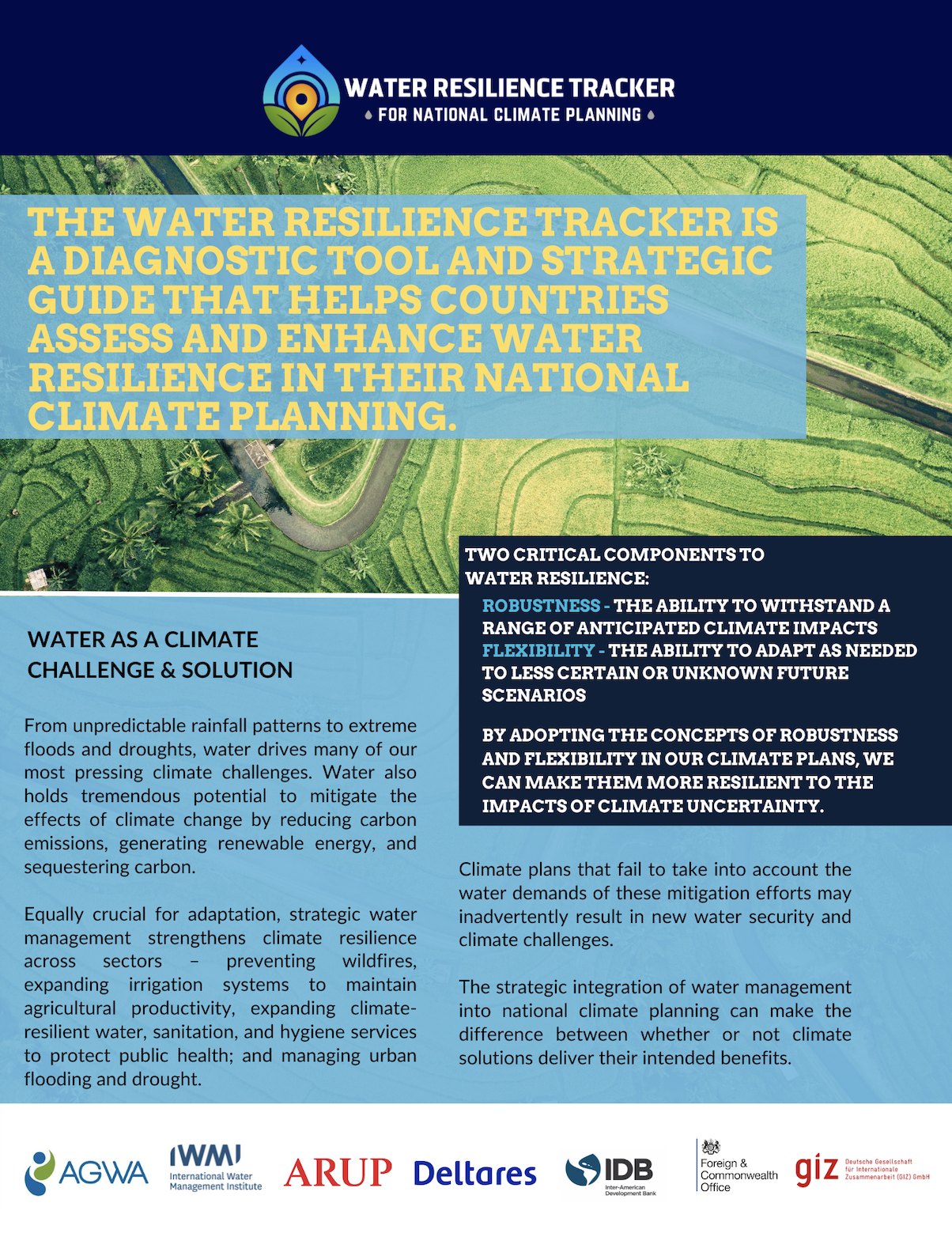The Water Resilience Tracker for National Climate Planning is a tool and diagnostic guide which supports the understanding and enhancement of water resilience in national climate plans.
From unpredictable rainfall patterns to extreme floods and droughts, water is widely recognized at the forefront of many climate disasters — the “teeth” of climate change.
But less often considered is the critical role of water in efforts to mitigate and adapt to climate change.
Water is embedded in many mitigation strategies to reduce carbon emissions, such as generating renewable energy and sequestering carbon.
Water is also vital for climate adaptation, such as expanding irrigation to address increased climate variability, managing urban flooding and drought, and developing reliable water, sanitation, and hygiene services.
Countries around the world are developing climate plans — including Nationally Determined Contributions (NDCs) and National Adaptation Plans (NAPs) — to meet commitments of the Paris Agreement and address climate impacts. In recent years, these plans have demonstrated significant progress towards climate action, but they typically neglect the strategic role of water in climate solutions.
Water is the lifeblood of society, the economy, and the natural environment. But climate change means that the availability of water for drinking, energy, agriculture, industry, and ecosystems can no longer be assumed. With increasing competition for limited water resources, there are difficult tradeoffs to make.
How national climate plans address water, and how water is managed as a resource when these plans are implemented, can make the difference between project success or failure.
“The very fact that water is so fundamental to life means responsibility is split between many different areas of individual governments. Policies can suffer from a lack of integration, and are harder to fund as a result. The Water Tracker seeks to tackle those problems.”
Effective climate action through water resilience
Simply put, water resilience is the ability of water-related policies, plans, and investments to cope with climate-related impacts.
The Water Resilience Tracker for National Climate Planning includes both a questionnaire framework and a Guidance Document, which together provide a clear pathway to design and implement coordinated and targeted climate action which acknowledges the critical role of water.
The Water Resilience Tracker Questionnaire guides climate planners and policymakers to systematically evaluate both the explicit and implicit ways in which water is included in a country’s national climate plans and planning processes. This includes exploring the synergies and tradeoffs between multiple water-using sectors. The Guidance Document identifies approaches for improving water resilience based on the outcomes of the Questionnaire.
By engaging with the Water Resilience Tracker, countries can ensure that plans are water-sensitive and able to withstand the impacts of climate change.
Water Resilience
Water resilience has two key elements: robust approaches to address a wide range of anticipated climate impacts, and flexible approaches that can change as needed to address impacts that are highly uncertain.
Who is the Water Resilience Tracker for?
The Water Resilience Tracker is especially a resource for national climate planners and policymakers, as well as international bodies and experts that provide support to climate planning.
It is also useful for line ministries, civil society, investment banks, aid agencies and other groups with a stake in evaluating the credibility and efficacy of national climate plans.
Who is involved?
The Alliance for Global Water Adaptation (AGWA) is overseeing the development of the Water Resilience Tracker in collaboration with the International Water Management Institute (IWMI), Deltares and Arup. Other partners include Sanitation and Water for All (SWA), the Global Water Partnership (GWP), and UNICEF.
The Water Resilience Tracker is currently working closely with a number of countries across Latin America, Asia, and Africa who are committed to strengthening water resilience in their national climate planning. Implementation of the Water Tracker is guided through close collaboration with stakeholders to ensure project outcomes are in line with on-the-ground needs of countries and reflect an approach which is applicable and scalable for country use.
The initiative has support from UK aid through the Foreign, Commonwealth, and Development office of the UK government, the Netherlands Ministry of Infrastructure and Water Management, the Inter-American Development Bank, The Deutsche Gesellschaft für Internationale Zusammenarbeit (GIZ), and UNDP.
Country Reports
Additional Articles
Acknowledgements
We extend our deep gratitude to the individuals and organizations who have and continue to provide feedback and recommendations for the development of the Water ResilienceTracker:
Wetlands International
Sonja Koeppel, Secretary of the Water Convention, UNECE
Hanna Plotnykova, Environmental Affairs Officer, UNECE
Kathryn Pharr, Senior Policy Advisor, WaterAid
Martin Kerres, GIZ
Andrea Salinas, GIZ
Anna Viktoria Bussmann, GIZ
Anil Mishra, UNESCO
Anthony Slayter, Special Adviser on Water to the Department of Foreign Affairs and Trade, Australia
Jonathan Rawlins, Sustainable Development Africa
Simon Thuo
Mario Lopez Perez
Neera Shrestha Pradhan, Senior Water and Adaptation Specialist/Programme Coordinator, Koshi Basin Initiative, ICIMOD
Emma Carmody, Managing Lawyer Freshwater Program, Environmental Defenders Office



































